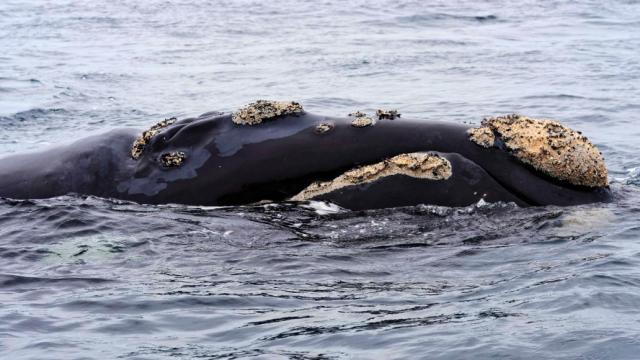The Obama administration’s record on environmental responsibility took a huge hit last Friday when the Feds approved not only energy exploration off the Eastern US seaboard for the first time in 40 years, but also the use of sonic cannons, which have been linked to immense disruptions of oceanic life. Who cares about the survival of the world’s 500 remaining Atlantic right whales; Virginia and the Carolinas need more fossil fuels to burn!
The energy industry is confident that there is upwards of $US195 billion worth of oil and natural gas off the Atlantic coast between North Florida and New England that could contribute $US23.5 billion to the economy per year between 2017 and 2035. And sonic cannons are what’s going to help them find it.
Sonic cannons, also known as seismic airguns, are towed behind boats, where they beam incredibly loud acoustic signals — often louder than a jet engine — every ten seconds down through the water column, where they penetrate the substrate and reverberate back to an array of hydrophones that listen for the return ping. That bounced signal is then processed by the sounding ship’s computers, which translate it into a detailed 3D map of any underground caverns or repositories where oil and natural gas might be hiding.
“It’s like a sonogram of the Earth,” Andy Radford, a petroleum engineer at the American Petroleum Institute, an oil and gas trade association in Washington DC, told the AP. “You can’t see the oil and gas, but you can see the structures in the Earth that might hold oil and gas.”
It’s not like you can make a quick day trip out of these exploratory endeavours. The sonic cannons must be towed for weeks, even months, at a time. In fact, hydrophone arrays hundreds and thousands of miles away from existing exploration projects off the coast of the Gulf of Mexico and Alaska have been known to pick up these underwater sonic booms. And given that the water amplifies these already deafening sounds by an order of magnitude or more, it’s no real surprise that sea life despises these machines. Or that they can wreak havoc with the underwater ecosystem.
A wide variety of sea life relies on audio cues to survive. Whales and other cetaceans rely on echolocation to feed, find mates, and communicate; fish and crabs use it to navigate. The US Bureau of Ocean Energy Management has spent the last few years compiling feedback from more than 120,000 members of the public (i.e. anybody who makes a living off of coastal tourism or fishing) and environmental experts on just how much harm sonic cannons can inflict on its unsuspecting victims. BEOM has even publicly stated that more than 138,000 sea creatures — including nine of the last 500 Atlantic right whales — would be susceptible to the cannon’s acoustic interference, though (surprise, surprise) the agency promptly ignored all of the public’s concerns all in favour of the oil lobby.
“The bureau’s decision reflects a carefully analysed and balanced approach that will allow us to increase our understanding of potential offshore resources while protecting the human, marine, and coastal environments,” acting BOEM Director Walter Cruickshank said in a statement. Except that researchers have no actual idea what these sonic cannons will do to marine life, because the Feds have precluded scientists from interacting with animals unless stringent rules are followed. The oil industry won’t have such problems because — aside from having to have a dedicated whale-spotter working the sounding ship — these entities have free reign to blast acoustic signals up and down the coast with abandon, fishes be damned. “We don’t know what the physiological effects are. It could be permanent hearing damage in many of these creatures just by one encounter with a high-energy signal,” Grant Gilmore, an expert on fish ecology in Vero Beach, Fl told the AP.
“Once they can’t hear — and that’s the risk that comes with seismic testing — they are pretty much done for,” Katie Zimmerman, a spokeswoman for the South Carolina Coastal Conservation League told the AP. “Even if there were oil out there, do we really want that? Do we really want to see these offshore rigs set up?” she asked.
The project has been pushed hard by southern coastal states like Virginia and the Carolinas, despite bans on off-shore oil exploration by many northern seaboard states (basically New Jersey and up). “I honestly feel we can go offshore and harvest the energy that’s out there,” South Carolina state Sen Paul Campbell told the AP. “I think we’re kind of foolish not to.” Of course, most of the exploration will actually be taking place in federal waters.
Once the existing ban on offshore energy exploration expires in 2017, all bets are off. At least you (and every animal under the waves) will be able to hear it coming. [HuffPo – AP – Oceana]
Picture: Alfredo Cerra
